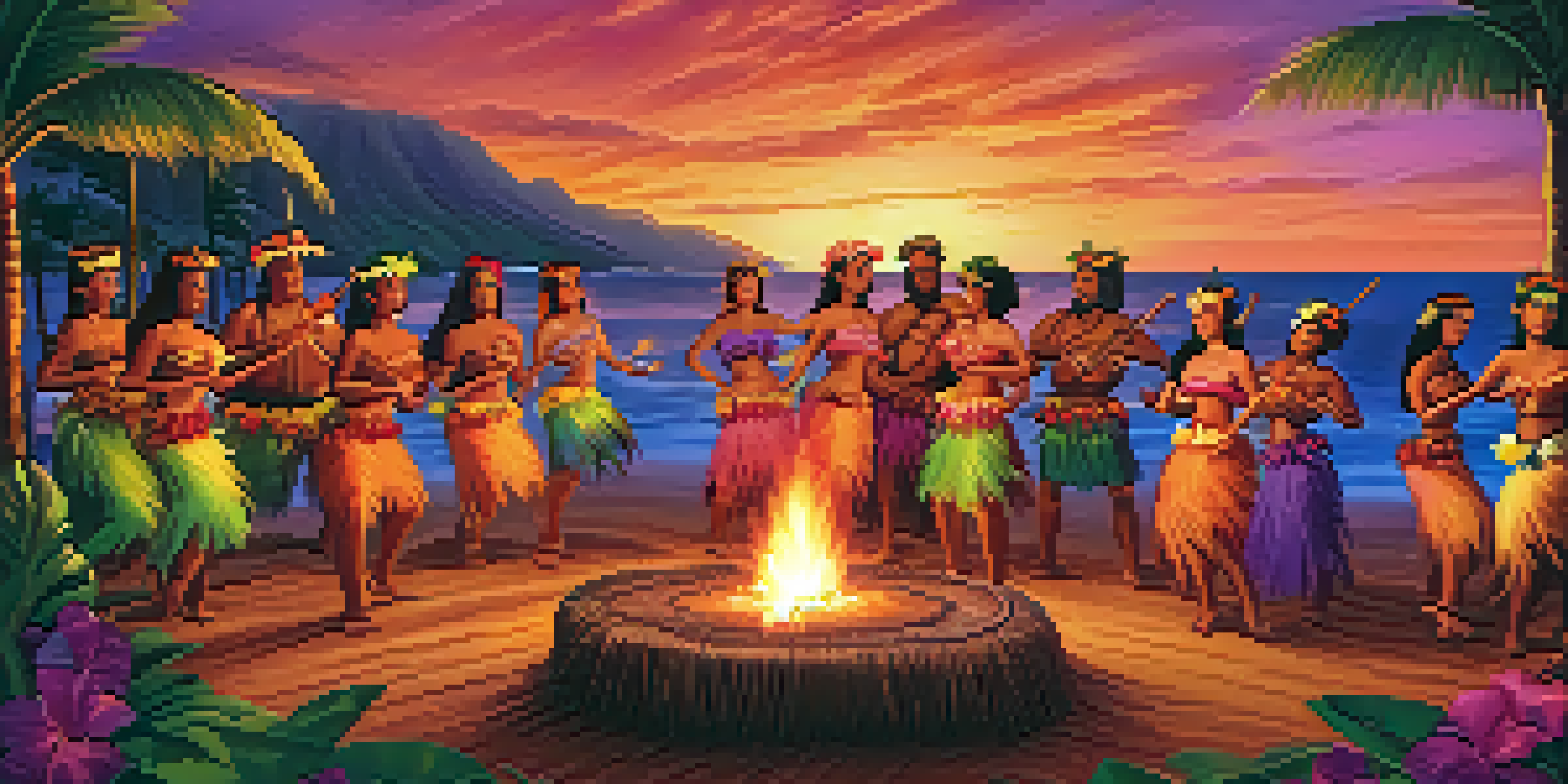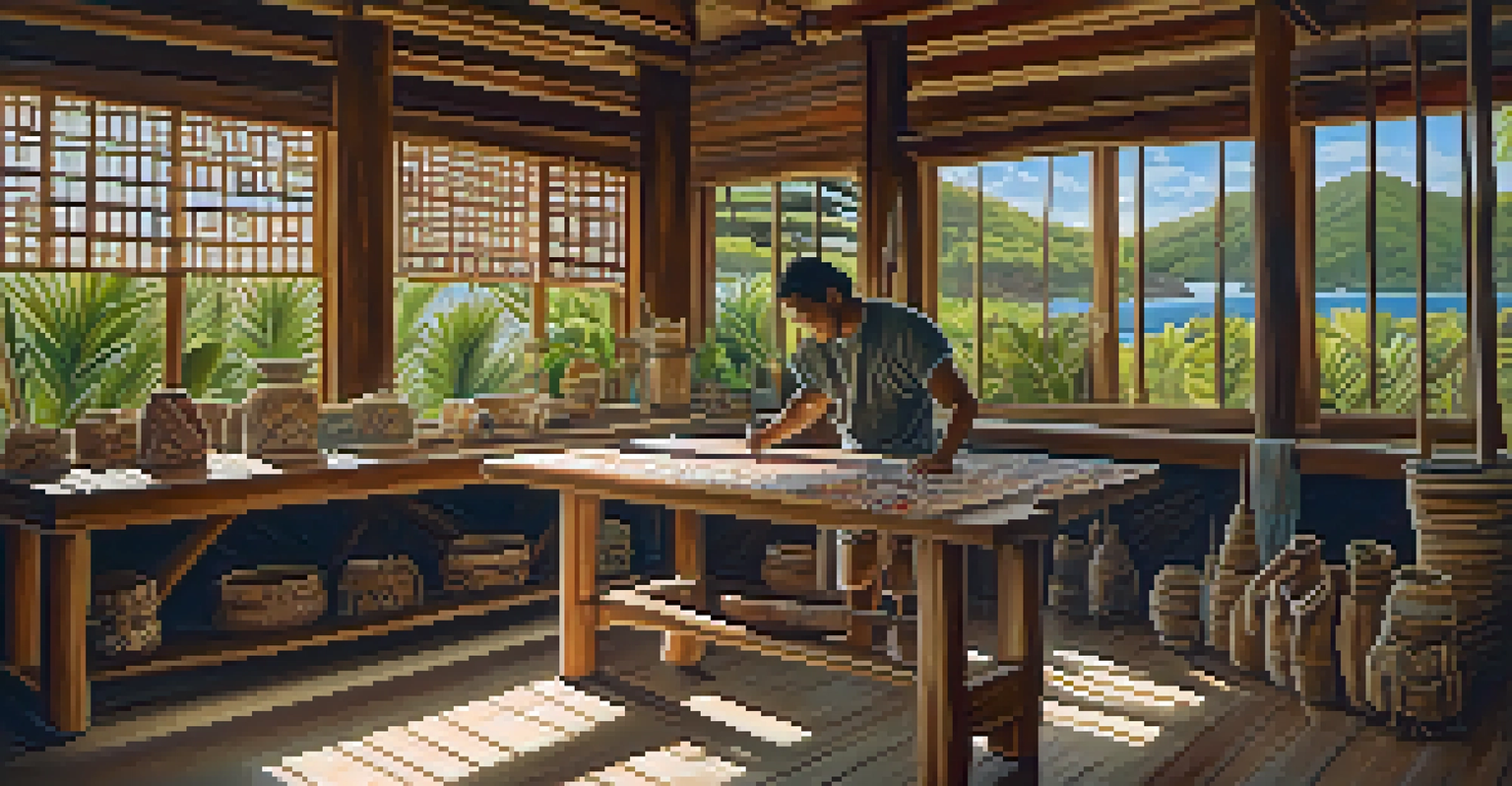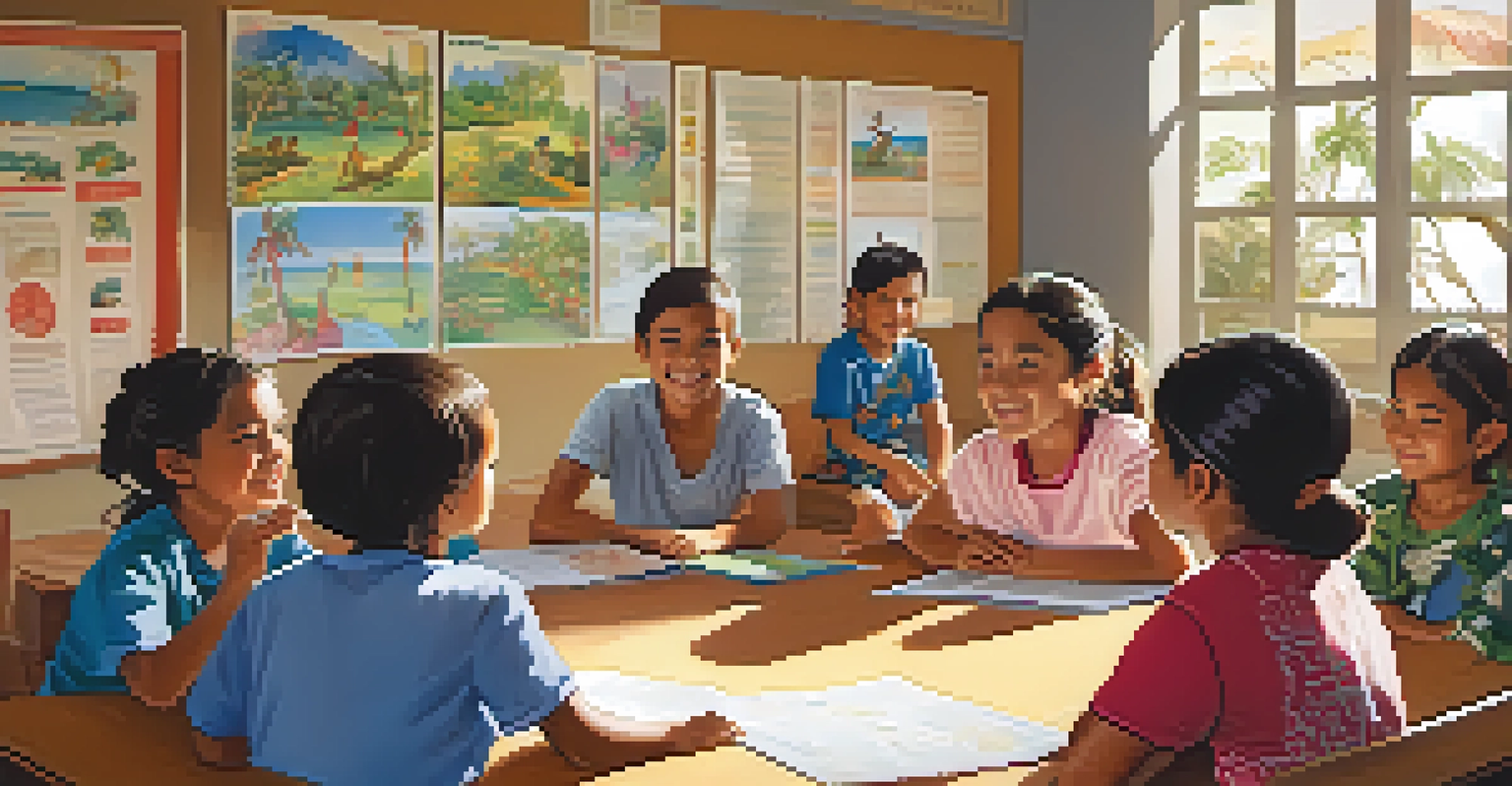Cultural Renaissance: Reviving Hawaiian Traditions and Identity

Understanding the Importance of Hawaiian Culture Today
Hawaiian culture is not just a relic of the past; it is a living, breathing part of the islands' identity. As modern influences sweep through, it becomes crucial to understand how these traditions shape the lives of Hawaiians today. This cultural identity is woven into the fabric of community life, from language to music and hula, each element telling a story that connects generations.
Hawaiian culture is a living expression of the land and its people, a narrative woven through generations.
The essence of Hawaii is encapsulated in its customs, practices, and values, which promote a sense of belonging and pride among its people. For instance, the practice of 'Aloha' embodies love, compassion, and respect, principles that guide interactions both within and outside the community. By embracing these values, Hawaiians are not only preserving their heritage but also enriching their contemporary lives.
In a world that often prioritizes globalization, the revival of Hawaiian traditions stands as a testament to the resilience and strength of cultural identity. It’s a call for Hawaiians to reclaim their narratives, ensuring that their stories and traditions are not lost but celebrated and shared.
Key Traditions Being Revived in Hawaii
Several key traditions are experiencing a renaissance, including the practice of hula, traditional crafts, and the Hawaiian language. Hula, often viewed as a dance form, is a profound expression of storytelling and spirituality that connects dancers to their ancestors. Today, hula schools are popping up across the islands, attracting both locals and visitors eager to learn and participate.

Another significant revival is seen in the art of featherwork and kapa (bark cloth) making. These crafts not only showcase incredible artistry but also provide a means for artisans to connect with their heritage. Workshops and classes are increasingly available, allowing both young Hawaiians and interested tourists to experience the process of creating these traditional items.
Revival of Hawaiian Traditions
Key cultural practices, such as hula and the Hawaiian language, are being revitalized, fostering a sense of identity among locals.
The Hawaiian language, or 'Ōlelo Hawaiʻi,' is also witnessing a resurgence, with immersion schools and community classes fostering fluency among a new generation. As language is a core component of cultural identity, this revival reinforces the connection to history and promotes pride in Hawaiian heritage. Through these efforts, a renewed sense of identity flourishes, bridging past and present.
The Role of Community in Cultural Revival
Community plays a pivotal role in the revival of Hawaiian traditions, fostering a collective spirit that strengthens cultural bonds. Local organizations and grassroots movements are crucial in promoting events that celebrate traditional practices, such as luaus, festivals, and cultural workshops. These events not only educate participants but also create a sense of community pride and belonging.
To know the history of Hawaii is to understand the importance of its culture and the resilience of its people.
Moreover, intergenerational knowledge transfer is vital in this process. Elders share stories, skills, and wisdom with younger generations, ensuring that traditions are passed down. This connection between the past and the future enriches the community and reinforces the importance of cultural preservation.
In essence, the revival of Hawaiian traditions is a community-driven effort, where every member plays a part. Whether through participation in cultural events or simply sharing stories at family gatherings, the collective enthusiasm for preserving and honoring Hawaiian culture is palpable and inspiring.
Celebrating Hawaiian Festivals and Events
Festivals and events throughout Hawaii serve as vibrant platforms for cultural expression and celebration. The Merrie Monarch Festival, for instance, is a renowned hula competition that attracts participants from around the world, showcasing the beauty and depth of this traditional art form. Such events not only highlight the talent of performers but also draw attention to the significance of hula in Hawaiian culture.
Additionally, events like the Aloha Festivals celebrate the spirit of aloha through parades, music, and local cuisine, inviting both locals and tourists to immerse themselves in Hawaiian culture. These gatherings foster a sense of community while educating attendees about the rich history and traditions of the islands.
Community's Role in Preservation
The collective efforts of communities in promoting cultural events and sharing knowledge ensure that Hawaiian traditions are passed down through generations.
As these festivals continue to grow, they play a crucial role in reviving interest in Hawaiian culture, encouraging participation, and promoting cultural pride. They are celebrations of identity that resonate deeply with the community, reminding everyone of the importance of heritage and tradition.
The Impact of Tourism on Cultural Renaissance
Tourism, while often viewed through a commercial lens, can significantly impact the revival of Hawaiian culture. Visitors are increasingly seeking authentic experiences, prompting local businesses and cultural organizations to offer workshops, tours, and events that highlight traditional practices. This shift in tourist interest provides economic support for cultural preservation initiatives.
However, it’s essential to approach tourism thoughtfully. The challenge lies in balancing the influx of visitors with the need to maintain the integrity and authenticity of Hawaiian traditions. Local communities are actively engaged in this dialogue, ensuring that cultural practices are respected and not commodified.
Ultimately, when approached with care, tourism can be a powerful ally in the cultural renaissance of Hawaii. It offers a platform for sharing stories, traditions, and experiences, fostering a deeper understanding of Hawaiian identity among visitors and encouraging respect for its rich heritage.
Education as a Tool for Cultural Preservation
Education is a cornerstone of the cultural renaissance in Hawaii, playing a vital role in fostering understanding and appreciation for local traditions. Schools are increasingly incorporating Hawaiian history, language, and culture into their curricula, ensuring that young students grow up with a strong sense of identity. This educational focus not only benefits Hawaiian children but also informs non-Hawaiians about the significance of these traditions.
Moreover, cultural programs and workshops offered by local organizations provide hands-on learning opportunities. From ukulele lessons to traditional cooking classes, these programs engage participants in the active practice of Hawaiian culture. This experiential learning fosters a deeper connection to the traditions and encourages participants to share their newfound knowledge with others.
Impact of Tourism on Culture
Tourism can support the revival of Hawaiian culture by encouraging authentic experiences, but it must be approached with care to maintain cultural integrity.
As education continues to embrace Hawaiian cultural elements, it nurtures a generation that values and respects its heritage. This conscious effort to integrate culture into everyday learning promotes pride and helps ensure that Hawaiian traditions thrive for years to come.
Looking Ahead: The Future of Hawaiian Culture
The future of Hawaiian culture looks bright, with a growing movement dedicated to preserving and revitalizing traditions. As more people become aware of the significance of cultural identity, there is a collective effort to ensure that Hawaiian practices are passed down and celebrated. This cultural renaissance serves as a reminder of the resilience of the Hawaiian people and their commitment to their heritage.
Innovative approaches, such as online platforms for learning and sharing traditions, are emerging, making cultural education more accessible. These digital spaces allow for broader participation, connecting Hawaiians across the globe and fostering a sense of community, no matter the distance.

As we look to the future, the ongoing revival of Hawaiian culture stands as a testament to the power of community, education, and respect for heritage. By embracing their past while adapting to the modern world, Hawaiians are paving the way for a vibrant cultural legacy that will endure for generations to come.